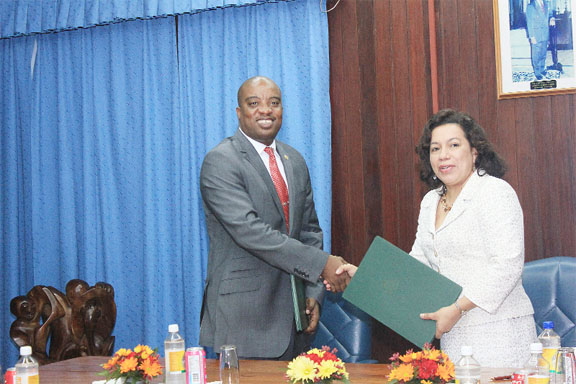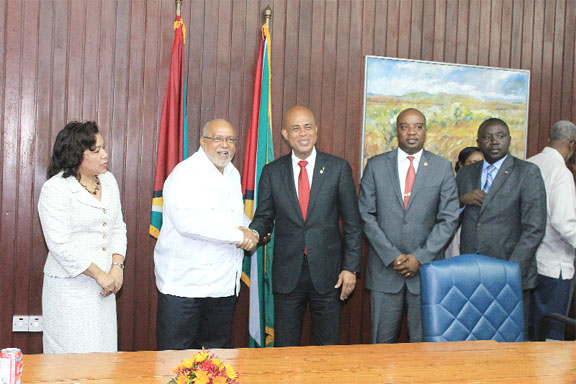Guyana and Haiti yesterday signed an agreement to trace the origin of agricultural products traded between the two countries to ensure food safety.
The Memorandum of Understanding on the Utilisa-tion of the Haitian National Traceability System in Guyana was signed by Minister of Foreign Affairs Carolyn Rodrigues-Birkett and Minister of Foreign Affairs of Haiti, Pierre Richard Casimir at the Office of the President. The signing took place shortly after President Donald Ramotar and members of his cabinet met with Haitian President Michel Martelly and his delegation.
The agreement will come into force once the two countries enact supporting legislation for the tracing of food products from production sites. As a result of it, if produce is purchased from a particular farm for exportation, for example, that farm has to be registered and certified and the kinds of pesticides and fertilisers used would have to be known.
“The two countries will work together to develop our systems,” Minister of Agriculture Dr Leslie Ramsammy told reporters at the signing, while adding that Guyana is interested in Haiti’s traceability for coffee, which can then be used for all our products. Haiti, with support from France, has developed traceability legislation for its coffee and is working on having it done for mangoes.

At the last Heads of Government meeting in Haiti, Ramsammy noted, it was agreed that Caricom should look at what Haiti has for coffee and see if a standardised version for the region could be developed. “Whilst that negotiation is going ahead at the Caricom level, Haiti and Guyana have decided that we would go ahead with our collaboration and not wait for all the countries to agree,” the minister said.
He noted Guyana has been drafting traceability legislation as part of its Food Safety Bill and he explained that the Caribbean needs this kind of legislation for export to other countries.
Ramsammy hopes that by next year Guyana would be able to have the traceability for its food produce, which would mean that the country’s exports would not be restricted to North America and to Europe.
Ramsammy’s Haitian counterpart, Thomas Jacques, noted he is in Guyana to continue discussions, since Guyana is the main producer of many products in the Caribbean, such as rice and sugar. “Haiti wants to collaborate with Guyana to develop agriculture also, so that’s the reason for the government being here to discuss with the government of Guyana,” Jacques told Stabroek News.
Asked about the progress of the discussions between the two countries on Guyana’s rice breaking into the Haitian market, Ramsammy said discussions are ongoing and that Haiti has the potential to take about 120,000 tonnes of rice from Guyana but they still have some things to agree on, including price.
“But we have offered to help Haiti in terms of their rice industry… over the next couple of weeks, we are going to develop some agreements between the two countries. We are willing to provide technical support in the rice industry, so we are not only interested in selling Haiti rice, we are also interested in helping them in developing their own rice industry,” he explained.
Meanwhile, President Martelly, who is also Chair-man of Caricom, said that President Ramotar has stood up for the Haitian people on many occasions. He noted that his visit to Office of the President, where he met with Ramotar and Cabinet ministers, was an opportunity to thank the president who assured that his “will to better the lives of the Haitian people is not just the president…it is the movement, the government is behind it and also the people of Guyana.”
“Most importantly, we are trying to introduce a new way of doing things where both people, both countries can benefit from any type of cooperation, whether it is in agriculture, whether it is inviting enterprises from Guyana to come to Haiti and participate in its reconstruction, because in every sector we have things to do…,” Martelly added.

Addressing Haiti’s recovery from the devastating 2010 hurricane, Martelly said it was “moving forward pretty good,” while noting that since he became president he has been able to remove more than two thirds of his displaced citizens from living under tents. He said just about 300,000 persons remain of the over one million persons who were living under tents when he took office. “So, things are moving slowly but surely. The image of Haiti is changing throughout the world. The Haiti that was always in hiding, silent or talking about misery and problems no longer exists. [It is a Haiti] who also wants to present its opportunity to the world, do business with the world, change the images and also show what we have that we consider as wealth, so people can see us differently,” Martelly said.





